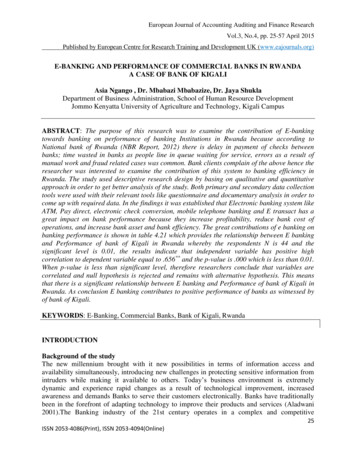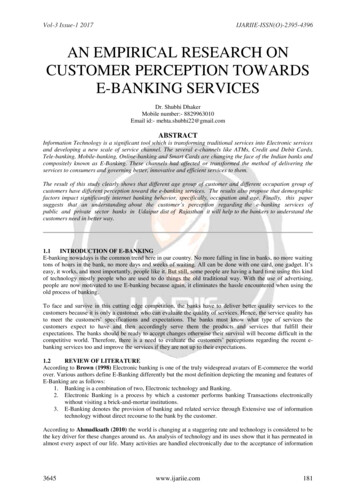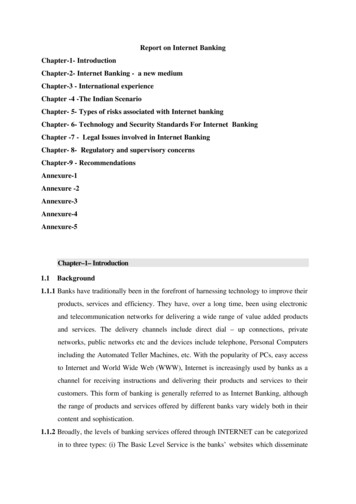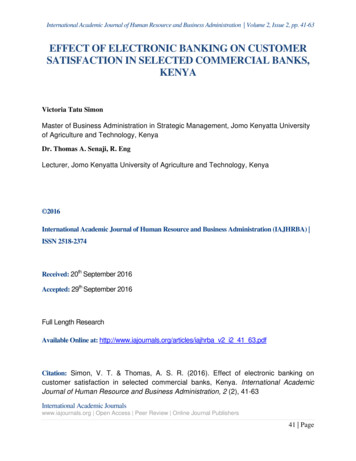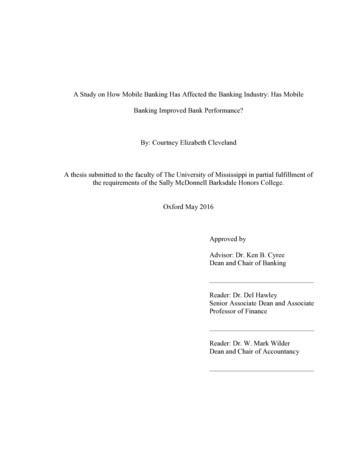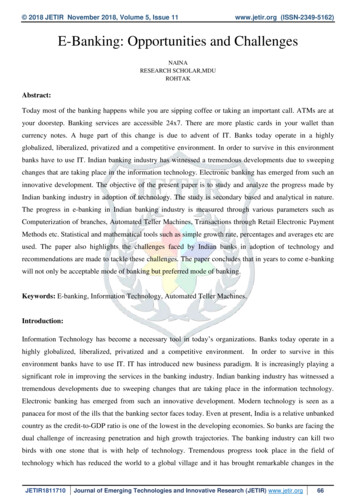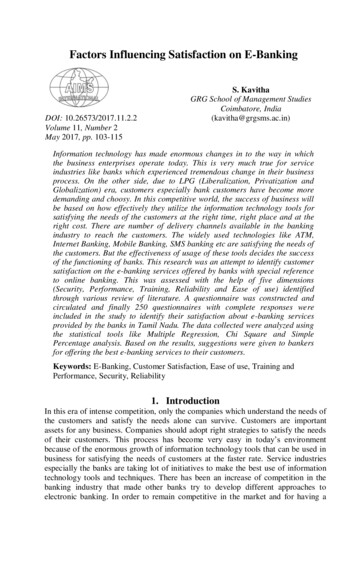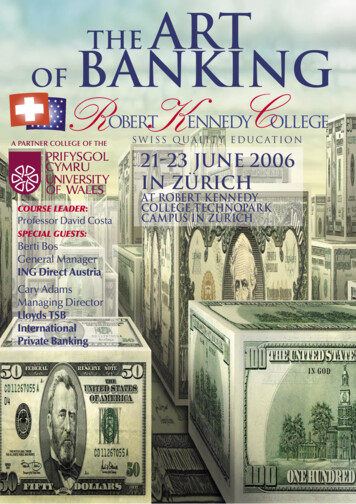
Transcription
ARTOF BANKINGTHEA PARTNER COLLEGE OF THES W I S S Q U A L I T Y E D U C AT I O N21-23 JUNE 2006IN ZÜRICHCOURSE LEADER:Professor David CostaSPECIAL GUESTS:Berti BosGeneral ManagerING Direct AustriaCary AdamsManaging DirectorLloyds TSBInternationalPrivate Bankingat ROBERT KENNEDYCOLLEGE TECHNOPARKCAMPUS IN ZÜRICH
ARTOF BANKINGTHEThe Art of Banking isan exclusive executiveeducation programoffered by the RobertKennedy College in ZurichSwitzerland that is designedto teach bank executiveshow to succeed in thehighly competitive financialmarketplace. It will be heldin the unique surroundingsof Zürich between the 21and 23 June 2006.The Art of Banking isdesigned around six strategicprinciples, derived fromSun Tzu’s Art of War, thatwinning strategists haveused to succeed in business.Each master class in theprogram focuses on oneof these principles while itdescribes very practical keysto banking success. Topicsinclude:1.The banking industryfaces an era of change.New technologies, newregulations, new customerexpectations, and thedecreased importance ofgeography in competition allaffect the fortunes of eachinstitution. This programis designed to meet thecontinuing education needsof banking executivesto keep pace with thatchange, both its risks and itspossibilities.2.3.4.5.6.Winning Strategies inBankingLeadership in BankingTaking Advantageof Strengths andWeaknessesThe Power of InfluenceeBusiness, OnlineBanking: Past, Presentand Future of Bankingin the New EconomyInnovation andExpansion: NewHorizons in BankingAfter the program, you will increase the level of yourknowledge in different areas of bank management to includeleadership, competitive assessment, decision making, andexecution. Class leaders will discuss best practices for bothtraditional services and new services such as ebusiness. Aftercompleting the Art of Banking you might decide to progresswith the University of Wales Post Graduate Certificate inAdvanced Banking Management which can be undertaken bythe means of online/distance learning studies.The Art of Banking further develops Sun Tzu’s proven ideas onhow to win and uses case examples from Harvard BusinessSchool to illustrate these ideas in the banking arena. LikeSun Tzu’s famous book, Art of War, the teaching of the Artof Banking will help you win day-to-day battles for businesswaged between you and your competitors.This program has a limited number of places.To attend, please contact us at Telephone 41 44 308.3908or email banking@wales.college.ch21 - 23 JUNE 2006 IN ZÜRICH
ARTOF BANKINGTHEWHO SHOULD ATTEND?This course is relevant to investment andcommercial bankers as well as executives inother institutions, such as insurance companies,that sell investment-related products. Corporatetitles typical of the class include: Chief Financial OfficerFinance DirectorChief Treasury OfficerFinancial ControllerChief AccountantCorporate Treasury OfficerSenior Executive Financial InstitutionsGroupHead of Capital MarketsHead of Capital Strategy & PlanningHedge Fund ManagerChief EconomistHead of Risk ManagementCompliance OfficerBanking RegulatorThe following is a description of each masterclass held in the program:MASTER CLASS 1WINNING STRATEGIES IN BANKINGTherefore the skillful leader subdues the enemy’s troops without any fighting; hecaptures their cities without laying siege to them; he overthrows their kingdomwithout lengthy operations in the field.With his forces intact he will dispute the mastery of the Empire, and thus, withoutlosing a man, his triumph will be complete. This is the method of attacking bystratagem. Sun TzuIn a banking environment where the differences between competing institutions arenot always obvious, the importance of strategy, both its planning and its execution,is critical to winning. Winning strategies succeed at creating the intended resultsof the practitioner despite the actions and counteractions of competitors. They takeinto account competitors that appear from a number of angles, to include direct,substitute, new entry, economic, complementary, and customer. The ultimate goalin strategy is to win with both the objective and your resources intact. In highlycompetitive environments, this is a difficult goal to achieve. In this class, you willlearn how to see the entire competitive environment, and the entire range of strategicpossibilities, whereby you have the opportunity to make better decisions faster andwith a greater degree of flexibility than your competitors.21 - 23 JUNE 2006 IN ZÜRICH
ARTOF BANKINGTHEClass leaders will focus on the strategic principle of winning whole described bySun Tzu. In the highly competitive environment Sun Tzu knew, during the time ofwarring Chinese states, if one state depleted its resources so much that it could notdefeat another state, a third state was likely to step in and conquer both. This classwill present several Harvard Business School case studies, to include „The BlueOcean Strategy“. You will learn how to plan your strategy to win in a competitiveenvironment where competing interests of other people work against your plans.MASTER CLASS 2LEADERSHIP IN BANKINGThus it is that in war the victorious strategist only seeks battle after the victory hasbeen won, whereas he who is destined to defeat first fights and afterwards looks forvictory. Sun TzuA leader serves his people best when he positions them where they can best employtheir talents to meet the bank’s objectives. If the leader does his or her job proficiently,then winning is already assured before employees execute their tasks.Bank leaders must have a thorough understanding of their institution’s objectives,its strengths and weaknesses, and have the talent to know where to step in andwhere to step back while employees execute day-to-day bank operations. Duringthe execution of operations, leadership skills determine whether a bank will or willnot receive the highest return possible on the talent of its employees, and what levelof talent will seek to work for that bank.This class will integrate several Harvard Business School case studies to include“Developing Leaders: How Winning Companies Keep On Winning,” “The CreditSuisse Group: Harvard Business School Case Study,” and “When Failure Isn’t anOption.” You will learn how to better understand your team members and how tosuccessfully use your leadership skills to foster outstanding team performance. Thisclass will focus on the strategic principle from Sun Tzu that a leader must positionhis forces to their point of best advantage, and then allow his charges the opportunityto do their job to win.21 - 23 JUNE 2006 IN ZÜRICH
ARTOF BANKINGTHEMASTER CLASS 3TAKING ADVANTAGE OFSTRENGTHS AND WEAKNESSESIf you know the enemy and know yourself, you need not fear the result of a hundredbattles. Sun TzuThe banking profession is one of the most competitive professions in business. In theenvironment this competitiveness creates, bank managers often fail to fully appreciatethe strengths and weaknesses of both their organization and the organizations ofcompetitors. This can cause bank managers to execute strategies that to not take fullaccount of the likely reaction from competitors.The importance of strengths and weaknesses in competition is easy to understandbut hard to use in practice. It is hard to use in practice because a strength orweakness is always relative. A capability that you consider your strongest point onlyserves as strength if it is also stronger than a competitor’s capability.To develop the idea of strengths and weaknesses, this master class will includeboth a discussion of what strengths and weaknesses really mean, plus an afternoonworkshop for assessing your organization’s strengths and weaknesses as they relateto your competitors. Various case studies will be used during this class to includeInterest Rate Regulation and Competition in the Banking Industry in Hong Kong andCitibank Argentina.MASTER CLASS 4THE POWER OF INFLUENCEAll warfare is based on deception.(Business Conversion: All business is based on influence.)When Sun Tzu wrote about deception in war, he described how to cause otherpeople to take action that they might not take without outside influence. While itis never a good idea to deceive customers, it is a good idea to influence them totake action that is in both their interest and your own. This creates the win-winagreement that is a cornerstone of business success.For your bank to succeed, it must create a perception of itself that its desired customerswant to see. Typically strategies to build influence involve advertising such ideals asstrength, foresight, and success. Bank employees must also present the right imageto allow customers and prospective customers to perceive the company values thatthe bank wants and expects customers to see.21 - 23 JUNE 2006 IN ZÜRICH
MASTER CLASS 5EBUSINESS, ONLINE BANKING:PAST, PRESENT AND FUTURE OFBANKING IN THE NEW ECONOMYHence in the wise leader’s plans, considerations of advantage and of disadvantagewill be blended together. Sun TzuOnline and electronic banking presents a unique opportunity for financial institutionsto reduce costs and optimize their operations. It follows a progression of evolution,in business and elsewhere, that the most competitive organizations learn how toattain the highest return with the least amount of effort.However, many banks find, and will continue to find, that direct person-to-personcontact offers benefits that exceed the higher costs of such contact. This means,based on the positioning of the bank in the market, that bank leaders need to findthe right balance between online/electronic banking and the person-to-person directcontact. Only in the most extreme positioning of low cost, do-it-yourself, and highend consultative banking will just one or the other service suffice.Based on the positioning of your bank, class leaders will discuss which services canbe automated and which should have human interaction. It will walk you throughthe past, present, and future of electronic banking with a number of Harvard BusinessTHEARTOF BANKINGThis class will focus on the Sun Tzu principle that it is more effective to get othersdo what you would like them to do on their own accord than to use force to achieveyour objectives. Class leaders will present several case studies, to include „What ItReally Means to Manage: Exercising Power and Influence” and “Customer Profitabilityand Customer Relationship Management at RBC Financial Group „that show thepower of advertisement in banking and person to person contact.21 - 23 JUNE 2006 IN ZÜRICH
ARTOF BANKINGTHESchool case studies to include Ing Direct Online Banking, FleetBoston Financial:Online Banking, and Japan Net Bank: Japan’s First Internet-Only Bank. This class isbased on the Sun Tzu principle that winning organizations tend to evolve an evermore refined balance of efficiency and effectiveness.class will focus on the strategic principle from Sun Tzu that a leader must positionhis forces to their point of best advantage, and then allow his charges the opportunityto do their job to win.MASTER CLASS 6INNOVATION AND EXPANSION:NEW HORIZONS IN BANKINGWhoever is first in the field and awaits the coming of the enemy, will be fresh forthe fight; whoever is second in the field and has to hasten to battle will arriveexhausted.Therefore the clever combatant imposes his will on the enemy, but does not allowthe enemy’s will to be imposed on him. Sun TzuWinning in banking does not necessarily mean doing everything perfectly. It doesmean doing everything important a little better, faster, or cheaper than competitors,or operating in a way or place that competitors do not yet operate.Being first to leverage an idea or a position often presents a unique advantage fora bank, and is critical for owning the initiative. It also entails risk. This class willdiscuss how banks can take smart risks to advance their businesses by expandingtheir scope of possibilities for innovation, and will also discuss the effective useof business intelligence. It will include discussion of first mover advantages andnew product advantages, plus show the rising use of intellectual property protectionvehicles, such as patents, that are more traditionally the domain of research-basedorganizations.The focus of this class is the Sun Tzu principle that owning the initiative createsadvantages. It will include case studies to include American Express and“ Bankof America : retail banking innovation“.21 - 23 JUNE 2006 IN ZÜRICH
ARTOF BANKINGTHEABOUTTHE COURSE LEADERPROFESSOR DAVID COSTA is one of the founders ofRobert Kennedy College and Dean of Faculty.In his capacity as Dean, Professor Costa oversees the faculty review process andseveral of the academic programmes of the college.Dean Costa is a Fellow of the Wharton School, University of Pennsylvania.After graduating with a degree in Jewish Studies Dean Costa read law at the Schoolof Law of the University of Northumbria, Newcastle.He has complemented his legal studies with the Advanced Project ManagementProgram, Stanford University, from which he has graduated with the widely respectedtitle of Stanford Certified Project Manager.He then expanded his knowledge of business through the EntrepreneurshipDevelopment Programme of the Sloan School of Management, MassachusettsInstitute of Technology.Professor Costa’s fields of interest are e-commerce, relationship marketing and hightech entrepreneurship. He maintains his interest and knowledge of legal mattersand he is a member of the Honourable Society of the Middle Temple.SPECIAL GUESTSBERTIL BOS - General Management ING Direct AustriaBertil Bos is General Manager of the Austrian branch of ING Direct. Austria is thelatest of 9 countries where ING Direct is executing its strategy. Prior to this he spent3 years in Frankfurt where he held the position of VP Risk Management at the largestING Direct subsidiary. From 1999 to 2002 Bertil helped in starting up ING DirectSpain in Madrid in the job of the Market Risk Manager. In1998 Bertil started hiscareer with ING Group with several short term assignments.Bertil holds an MBA (with Distinction) from INSEAD and holds a degree in IndustrialEngineering from the University of Twente in The Netherlands.Bertil is married and lives with his wife and 2 sons in Vienna.CARY ADAMSManaging DirectorLloyds TSB International Private Banking21 - 23 JUNE 2006 IN ZÜRICH
R E G I ST R AT I O NFORMPRINT THIS FORM AND FAX IT DULY SIGNED TO 41 1 308.3512THE ART OF BANKING21 - 23 JUNE 2006ZÜRICH SWITZERLANDSign and fax this form to 41 1 308 35.12For more information contact Prof.David Costa on 41 1 308.3908Name:Job x:Email:SignatureCOURSE FEE 4000 CHF (Swiss Francs) Material Included - 2 Delegates 7500 CHF (Swiss Francs)ACCOMODATION: 65/120 CHF per night (reservation form will be sent with the admission confirmation)Payment by Credit Card:Card Holder’s Name:Beneficiary Name: Robert Kennedy College & Co. - Sierre - SwitzerlandBeneficiary Bank: Banque Raiffeisen de Sierre et Région - Sierre - SwitzerlandAccount Nr. 222327.70; Clearning: 80598 SWIFT Code: RAIFCH22 IBAN: CH628 0598 0000 2223 277Card Type: VISA MASTERCARD AMERICAN EXPRESS DINERS CLUBCard Holder’s Name:Card No.Expiry Date/SignatureINFORMATION: For prior discussion on academic aspects of the course, applicants are invited to contact Prof. DavidCosta, Dean of Robert Kennedy College on: Tel: 41 1 308 3908 or Fax: 41 1 308 3512CANCELLATIONS: All registrations carry a 15% liability immediately a completed registration form has been receivedby the RKC office. To obtain an 85% refund, cancellations must be received by mail or fax 60 days prior to thecourse start date. Substitutions are welcome at any time. This registration form is a binding contract for the tuition feesamount.INDEMNITY: Should for any reason outside the control of RKC, the venue or speakers change, or the event be cancelleddue to acts of terrorism, extreme weather conditions or industrial action, RKC shall endeavour to re-schedule but theclient hereby indemnifies and holds RKC harmless from and against any and all costs, damages and expenses, includingattorneys fees, which are incurred by the client.The construction, validity and performance of this Agreement shall be governed in all respects by the laws of theCanton of Zurich , Switzerland the exclusive jurisdiction of whose Courts the Parties hereby agree to submit.
to banking success. Topics include: 1. Winning Strategies in Banking 2. Leadership in Banking 3. Taking Advantage of Strengths and Weaknesses 4. The Power of Influence 5. eBusiness, Online Banking: Past, Present and Future of Banking in the New Economy 6. Innovation and Expansion: New Horizons in Banking THE ART OF BANKING 21 - 23 JUNE 2006 IN .
